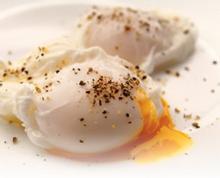Poached Eggs
Recipe courtesy of Our Kitchen & Culture, LLC
Serves 1 or 2 eggs per person
The best eggs for poaching are the freshest eggs you can find. If eggs are more than a week old, the whites thin out. Whites of fresh eggs will gather compactly around the yolk, making a rounder, neater shape.
(1) Poach eggs in a wide shallow pan. Use a pan that is at least 3-inches deep so there is enough water to cover the eggs, and they do not stick to the bottom of the pan. Also make sure your pan is wide enough to hold all the eggs you will be poaching, as you don't want the eggs to stick together. NOTE: I like to use a non-stick pan so the poached eggs will not stick to the bottom of the pan.
(2) Working with the eggs, one by one, break or crack each egg onto a saucer, ramekin, small cups, or bowls. We're doing this for two reasons: So you won't break the yolk and it prevents adding bad eggs. Place all cups of eggs so that they are convenient to the stove.
(3) If the water is too cool, the egg will separate apart before it cooks; if your water is too hot, you will end up with tough whites and an over-cooked yolk.
Water Temperature: You will want to bring the water to a temperature of about 160 to 180ºF (71-82ºC). As a rule of thumb, bring the water to a boil, then reduce it to a simmer before cooking. To obtain the correct temperature, spin the boiling water with a spoon to cool down the water before you drop in the egg. For best results use an instant read thermometer to test the water temperature (adjust heat to maintain the proper temperature).
Do not drop the egg into boiling water (212ºF or 100ºC). This will negatively affect the taste and texture of your eggs.
Do not add salt, which would do the opposite and loosen the whites.
Louisiana Recipes Weekly
|
Every Thursday you'll receive new recipes, events & festivals and more. See archive |


















